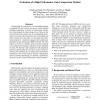Free Online Productivity Tools
i2Speak
i2Symbol
i2OCR
iTex2Img
iWeb2Print
iWeb2Shot
i2Type
iPdf2Split
iPdf2Merge
i2Bopomofo
i2Arabic
i2Style
i2Image
i2PDF
iLatex2Rtf
Sci2ools
131
click to vote
MICRO
1999
IEEE
1999
IEEE
Evaluation of a High Performance Code Compression Method
Compressing the instructions of an embedded program is important for cost-sensitive low-power control-oriented embedded computing. A number of compression schemes have been proposed to reduce program size. However, the increased instruction density has an accompanying performance cost because the instructions must be decompressed before execution. In this paper, we investigate the performance penalty of a hardware-managed code compression algorithm recently introduced in IBM's PowerPC 405. This scheme is the first to combine many previously proposed code compression techniques, making it an ideal candidate for study. We find that code compression with appropriate hardware optimizations does not have to incur much performance loss. Furthermore, our studies show this holds for architectures with a wide range of memory configurations and issue widths. Surprisingly, we find that a performance increase over native code is achievable in many situations.
Code Compression | Code Compression Algorithm | Code Compression Techniques | Hardware | MICRO 1999 |
Related Content
| Added | 04 Aug 2010 |
| Updated | 04 Aug 2010 |
| Type | Conference |
| Year | 1999 |
| Where | MICRO |
| Authors | Charles Lefurgy, Eva Piccininni, Trevor N. Mudge |
Comments (0)

